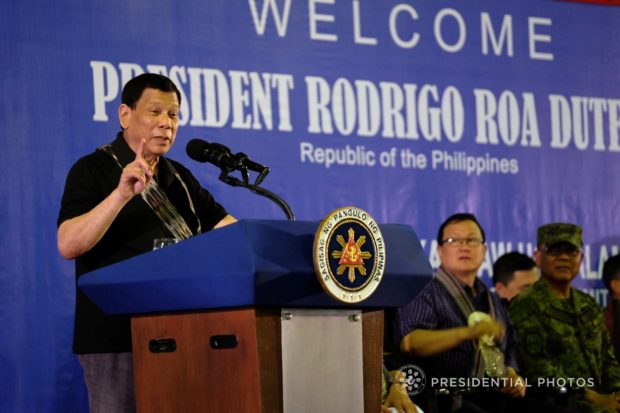
President Rodrigo Roa Duterte, in his speech during the Indigenous Peoples (IPs) Leaders’ Summit at the Naval Station Felix Apolinario in Panacan, Davao City on February 1, 2018. PRESIDENTIAL PHOTO
DAVAO CITY—President Duterte is open to the idea of a “hybrid” federal form of government if the public will not accept full federalism.
Mr. Duterte on Thursday night said he would accept some concessions if that was the only way a federal form of government could take shape.
“If you do not like federalism through and through, let’s have a hybrid form like that of Hong Kong and China,” Mr. Duterte told over 900 Mindanao “lumad” leaders.
Under China’s “one-country, two-systems” concept, Beijing maintains sovereignty over Hong Kong, which it calls the Hong Kong Special Administrative Region (SAR).
Hong Kong, a former British territory, enjoys certain political, judicial and economic freedoms but the central government in Beijing controls the SAR’s defense and security.
Macau, the former Portuguese enclave, also operates as Macau SAR with the same privileges enjoyed by its neighbor Hong Kong. The concept is intended to facilitate the reintegration of Taiwan with China while preserving its unique political and economic systems.
Make concessions
“If everyone does not approve (of full federalism), we make concessions. That is my only concern, I don’t want trouble,” Mr. Duterte said.
Earlier, the Catholic Bishops’ Conference of the Philippines (CBCP) expressed reservations over plans to amend the 1987 Constitution for a shift to a federal form of government.
Suspicions rife
The CBCP said that suspicions were rife because of the government’s lack of transparency and talk about “no elections” and term extensions.
Bishops also warned that turning Congress into a constituent assembly “is bound to be deficient of widespread peoples’ participation.”
“It would be totally rash for members of Congress to presume the reasoned approval of their constituents on so grave an issue as the move to overhaul the nation’s Charter,” they said.
Changing the 1987 Constitution was not necessary to devolve power, the CBCP said.
“Moreover, a … federal system that devolves power to the federal states on an equal basis would not satisfactorily address the aspirations of the Muslims and lumads in Mindanao for self-determination and respect for ancestral rights,” it added.
Presidential spokesperson Harry Roque said on Thursday that Malacañang understood “the sentiments of the Catholic bishops for their aversion to Charter change and federalism.”
“We, however, assure our bishops that the President has no interest to extend his term nor will he push for no election,” Roque said in Baguio City.
Mr. Duterte himself said he would not stay in power beyond his term.